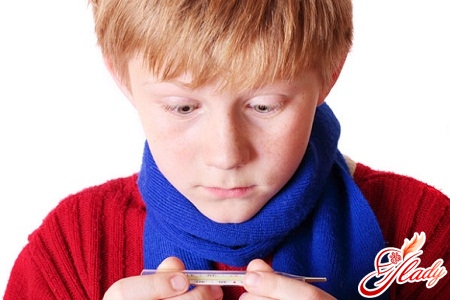 It would seem that yesterday you went shopping forNewborns and with a sinking heart they bought a dowry for their crumbs. But time flows imperceptibly, and today you are already worried about such a serious issue as the adaptation of a child in a kindergarten. Already for several decades there has been heated debate about whether a kindergarten is necessary for a child. One side believes that the stay of the baby in the kindergarten and his separation from the mother have an extremely negative impact on his psyche. Their opponents also claim that the so-called "home" children subsequently face serious problems with adaptation in the children's team. To say clearly which of them is right is quite difficult. Both points of view have the right to exist. The decision should be made only by parents, carefully weighing all the pros and cons. And in some cases (for example, the mother is forced to go to work) the answer to the question is obvious, since there is simply no other way out. If the kindergarten does exist, parents should take care of the adaptation period in the kindergarten as smoothly and painlessly as possible. After all, it will depend on this whether the going to the kindergarten for the baby will become a joy, or it will turn into daily torture and endurance "for strength" both of the child's and the parental nervous system. To drag a child who rests and yells with a good mother in the garden, and every day is a very dubious pleasure. In order to avoid this situation, and the period of adaptation in kindergarten has passed without complications and unpleasant moments, it is necessary to start preparing for the kindergarten at least six months before the expected date of the visit. If such training is neglected, the consequences may be the most unfavorable, up to childhood neuroses. To my great regret, very many parents think that the preparation for kindergarten is only to buy necessary clothes and change shoes, and also to go to the polyclinic medical commission. Of course, all this is just necessary, but this is the last stage in the process of preparing for a kindergarten. The preparation itself includes several components:
It would seem that yesterday you went shopping forNewborns and with a sinking heart they bought a dowry for their crumbs. But time flows imperceptibly, and today you are already worried about such a serious issue as the adaptation of a child in a kindergarten. Already for several decades there has been heated debate about whether a kindergarten is necessary for a child. One side believes that the stay of the baby in the kindergarten and his separation from the mother have an extremely negative impact on his psyche. Their opponents also claim that the so-called "home" children subsequently face serious problems with adaptation in the children's team. To say clearly which of them is right is quite difficult. Both points of view have the right to exist. The decision should be made only by parents, carefully weighing all the pros and cons. And in some cases (for example, the mother is forced to go to work) the answer to the question is obvious, since there is simply no other way out. If the kindergarten does exist, parents should take care of the adaptation period in the kindergarten as smoothly and painlessly as possible. After all, it will depend on this whether the going to the kindergarten for the baby will become a joy, or it will turn into daily torture and endurance "for strength" both of the child's and the parental nervous system. To drag a child who rests and yells with a good mother in the garden, and every day is a very dubious pleasure. In order to avoid this situation, and the period of adaptation in kindergarten has passed without complications and unpleasant moments, it is necessary to start preparing for the kindergarten at least six months before the expected date of the visit. If such training is neglected, the consequences may be the most unfavorable, up to childhood neuroses. To my great regret, very many parents think that the preparation for kindergarten is only to buy necessary clothes and change shoes, and also to go to the polyclinic medical commission. Of course, all this is just necessary, but this is the last stage in the process of preparing for a kindergarten. The preparation itself includes several components:
- Information preparation.
- Psychological preparation.
- Physiological preparation.
To achieve the best result, preparation must begin in advance, otherwise it will in itself be a heavy psycho-emotional burden on the fragile psyche of the child.
Adaptation of the child to the kindergarten - information preparation
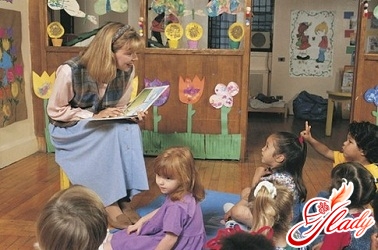 First of all parents should in advancechoose the right kindergarten. It's a long time ago when all preschool educational institutions worked on the same principle and proudly carried the title of "kindergarten". In our time, it is very difficult to find two similar kindergartens, that is why it is so important to choose the kindergarten that would most fully meet the needs of your baby and meet your requirements. The following is a classification of kindergartens and a brief description of each type.
First of all parents should in advancechoose the right kindergarten. It's a long time ago when all preschool educational institutions worked on the same principle and proudly carried the title of "kindergarten". In our time, it is very difficult to find two similar kindergartens, that is why it is so important to choose the kindergarten that would most fully meet the needs of your baby and meet your requirements. The following is a classification of kindergartens and a brief description of each type.
- Kindergarten General developing type. This type of kindergarten places special emphasis on the comprehensive, harmonious development of children, both physical and intellectual. The main motto of such kindergartens is little by little.
- Kindergarten of supervision and rehabilitation. The main priorities of this kind of kindergartens are directed to carrying out various strengthening and improving procedures. Your baby can be offered daily use of oxygen cocktails or systematic courses of health or therapeutic massage, hardening. But do not expect any kind of in-depth training in such a kindergarten, which will contribute to the intellectual development of the baby; most likely the matter will be limited only to the standard program.
- Kindergarten compensating type. As a rule, each such garden operates on one specific profile. Pupils of such gardens are children who have any deviations from normal development: both physical and mental. For example, such kindergartens are designed for children with speech therapy problems, with a delay in general mental development, diseases of the musculoskeletal system, suffering from impaired functioning of the auditory or visual apparatus, just often and long-term ill children.
In similar gardens medical workers andteachers of narrow specialization, who have experience working with this group of children. With the children there is a constant in-depth work aimed at improving and developing children. As a rule, in the gardens of the compensating type, a special diet, suitable for them, is selected for children. In addition, most often in such gardens with children, and with parents, psychologists work, which help them to adapt in society. In order for the child to fall into a similar garden, it is necessary to have the appropriate direction from the doctors of the appropriate profile.
- Kindergarten is the center of the child's development. Such kindergartens set themselves the task of revealing as much as possible all the child's available abilities. Pools, computer classes and art studios are almost mandatory attributes of such kindergartens.
- Kindergarten combined type. This type of kindergartens is the most widespread. Such gardens include various groups: compensatory, recreational, developing.
Parents should choose a garden, focusing ontheir on the needs of the child and their financial opportunities, as the payment for visiting the kindergarten is also very different, since not all municipal gardens. Before you give the child to the kindergarten, find out what type of garden it is:
- Municipal gardens. They are in the register of the local department of education management and are subsidized at the expense of the state budget. In such gardens, payment is the smallest, as the parents pay only a portion of the amount necessary to keep the baby. The rest is paid by the state. As a rule, in such gardens all expenses for the purchase of toys, teaching aids and other things fall on the shoulders of parents, in a "voluntary - compulsory" form.
- Departmental kindergartens. This type of garden is in the register of a particular enterprise. The improvement of such a garden and the amount of payment for his visit directly depends on how much the enterprise allocates for these purposes. Most often, only a child of an employee of an enterprise can get into such a kindergarten.
- Commercial kindergartens. These gardens always have a huge number of advantages: a more delicious and balanced diet, an individual approach to each child, own highly skilled health workers, teachers, very good living conditions, a strong educational base, a small number of children in the group. The only drawback that a kindergarten possesses is the high cost of a child's stay.
- Family kindergarten. This garden is a kind of private gardens. The main difference is that the number of children in the group is very small, and there are children at home. Recently, this form of preschool education for children has become very popular. The big plus is that almost completely eliminates the difficult adaptation in kindergarten.
After you have decided on the choicekindergarten, you need to visit him and talk with the head of the kindergarten and educators in the alleged group of your child. Pay attention to the general atmosphere of the kindergarten, the living conditions: the presence of the kindergarten, the condition of playgrounds for walking, the general appearance of the adjacent territory. Indoors, pay attention to the condition of corridors, game rooms, bedrooms. Try not to notice for the teachers their relationship with the children. Be sure to find out about all the nuances of children staying in this garden. Try not to lose sight of the smallest details:
- List of documents required for enrollmentchild in this pre-school educational institution. In the future, this measure will help you avoid surprises and the need to receive a particular certificate in a hurry.
- Schedule. Knowing it, you can teach your child in advance, which will help to make the adaptation of the child in kindergarten much easier.
- Program of adaptation to kindergarten. In some kindergartens, they simply do not pay any attention to such questions, referring to it from the point of view: "It will weep and cease." In other gardens, entire adaptation programs have been developed that allow the child to get used to the kindergarten as quickly as possible. This issue should also be discussed with the manager of the kindergarten in advance, in order to avoid the occurrence of various misunderstandings.
All of the above information training is extremely useful, afterwards you will see for yourself.
Psychological training
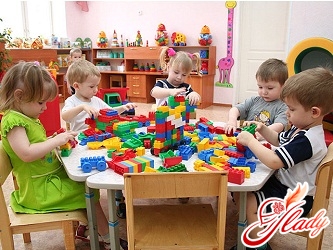 So, the garden is chosen, it completely suitsparents. They decide: "We are preparing for the kindergarten." The next stage should be the psychological preparation of your baby. It must be done very carefully and in stages, so as not to get the opposite effect and a strong negation from the side of the baby. Even in the event that your child is extremely inquisitive, lively and sociable kid, you should not neglect psychological preparation. After all, in an absolutely new and unfamiliar environment, even an adult will feel some kind of psychological discomfort, and so the baby can completely become locked in himself, which will lead to severe adaptation in the kindergarten. As a rule, if you start to prepare a child in advance for the necessity to attend a kindergarten, adaptation is much easier. However, do not just put the child before the fact. To begin with, you need to be slightly interested, and then give a clearer idea of what kindergarten is. To begin with, choose a route for walking with a child who will walk past the kindergarten. Time for a walk is necessary to choose exactly when the garden children will be on a walk. As a rule, any kid shows interest in a large number of children playing on the playground. If, suddenly, your child ignored this fact, take care of it carefully. You can tell the child that a kindergarten is a wonderful place where children play, draw, sing. However, mothers and dads are not allowed there, so that they do not interfere with the children. Mom and Dad bring the child in the morning, and in the evening they take him. After this story, observe the reaction of the child. If the baby shows increased interest and asks that you also take him to the kindergarten, explain to him that while you can not go to the kindergarten, you first need to grow up a little. Such walks must be made at least once a month. If the child does not show interest, you should not tell him that he will also go to kindergarten, otherwise the child will categorically reject everything related to the kindergarten. You need to make similar walks a little more often, besides, try to tell the kid something extremely interesting, connected with a kindergarten. After the kid gets an approximate idea of what kindergarten is, you can start the second point of psychological preparation. Agree with the manager about the opportunity to visit the kindergarten with the baby. As a rule, parents manage to get such permission quite easily. Your baby can watch how other children play and even join the nm. Approximately 95% of children with hunting play together with everyone. Many kindergartens have so-called "weekend groups", designed specifically for the adaptation of the child in kindergarten. As a rule, parents have the opportunity to bring the child to a kindergarten for several hours, on Saturday and Sunday. At this time, experienced teachers introduce the kids to the new, "garden" life, teach to exist in the team. Most often, in order to get into a similar group, it is enough only to get help from a pediatrician about the state of the baby's health and a written statement of the parents. The necessary information can be obtained from the employees of the kindergarten. The main task of this program for adaptation to kindergarten is the quickest adaptation of the baby to the children's team, the daily routine and discipline. This is a pretty good way of psychological preparation, which should not be neglected. In addition, parents can also make the adaptation of the child to a kindergarten easier, using role-playing games. Play along with the child by sending to your kindergarten your favorite toy. You can beat almost any situation, familiarize the child with the rules of behavior in the kindergarten, with the regime of the day, to give the necessary skills to communicate with peers. In addition, such games can provide invaluable service and at the time when the baby starts to visit the kindergarten. After observing the course of the game, you can learn a lot about the moral state of the baby and the surrounding psychological microclimate. Perhaps, the baby prefers to keep silent about some problems, but observant parents in the game will always be able to notice that their baby is disturbing something, and find out exactly what.
So, the garden is chosen, it completely suitsparents. They decide: "We are preparing for the kindergarten." The next stage should be the psychological preparation of your baby. It must be done very carefully and in stages, so as not to get the opposite effect and a strong negation from the side of the baby. Even in the event that your child is extremely inquisitive, lively and sociable kid, you should not neglect psychological preparation. After all, in an absolutely new and unfamiliar environment, even an adult will feel some kind of psychological discomfort, and so the baby can completely become locked in himself, which will lead to severe adaptation in the kindergarten. As a rule, if you start to prepare a child in advance for the necessity to attend a kindergarten, adaptation is much easier. However, do not just put the child before the fact. To begin with, you need to be slightly interested, and then give a clearer idea of what kindergarten is. To begin with, choose a route for walking with a child who will walk past the kindergarten. Time for a walk is necessary to choose exactly when the garden children will be on a walk. As a rule, any kid shows interest in a large number of children playing on the playground. If, suddenly, your child ignored this fact, take care of it carefully. You can tell the child that a kindergarten is a wonderful place where children play, draw, sing. However, mothers and dads are not allowed there, so that they do not interfere with the children. Mom and Dad bring the child in the morning, and in the evening they take him. After this story, observe the reaction of the child. If the baby shows increased interest and asks that you also take him to the kindergarten, explain to him that while you can not go to the kindergarten, you first need to grow up a little. Such walks must be made at least once a month. If the child does not show interest, you should not tell him that he will also go to kindergarten, otherwise the child will categorically reject everything related to the kindergarten. You need to make similar walks a little more often, besides, try to tell the kid something extremely interesting, connected with a kindergarten. After the kid gets an approximate idea of what kindergarten is, you can start the second point of psychological preparation. Agree with the manager about the opportunity to visit the kindergarten with the baby. As a rule, parents manage to get such permission quite easily. Your baby can watch how other children play and even join the nm. Approximately 95% of children with hunting play together with everyone. Many kindergartens have so-called "weekend groups", designed specifically for the adaptation of the child in kindergarten. As a rule, parents have the opportunity to bring the child to a kindergarten for several hours, on Saturday and Sunday. At this time, experienced teachers introduce the kids to the new, "garden" life, teach to exist in the team. Most often, in order to get into a similar group, it is enough only to get help from a pediatrician about the state of the baby's health and a written statement of the parents. The necessary information can be obtained from the employees of the kindergarten. The main task of this program for adaptation to kindergarten is the quickest adaptation of the baby to the children's team, the daily routine and discipline. This is a pretty good way of psychological preparation, which should not be neglected. In addition, parents can also make the adaptation of the child to a kindergarten easier, using role-playing games. Play along with the child by sending to your kindergarten your favorite toy. You can beat almost any situation, familiarize the child with the rules of behavior in the kindergarten, with the regime of the day, to give the necessary skills to communicate with peers. In addition, such games can provide invaluable service and at the time when the baby starts to visit the kindergarten. After observing the course of the game, you can learn a lot about the moral state of the baby and the surrounding psychological microclimate. Perhaps, the baby prefers to keep silent about some problems, but observant parents in the game will always be able to notice that their baby is disturbing something, and find out exactly what.
Physiological preparation for kindergarten
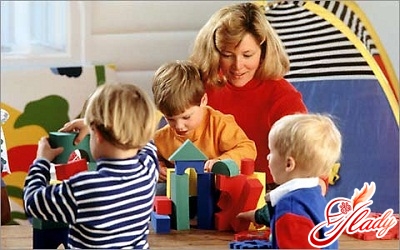 No less important is the physiologicalPreparation of the baby to visit the kindergarten. The first thing you should pay attention to is the training of the child with the necessary skills of self-service, such as:
No less important is the physiologicalPreparation of the baby to visit the kindergarten. The first thing you should pay attention to is the training of the child with the necessary skills of self-service, such as:
- The ability to self-eat - use a fork and spoon, drink not from a bottle, but from a cup. It is also necessary to teach the child not to indulge in food.
- Controlling your physiological needs, informing adults about your desire to go to the toilet. Teach your child to use the toilet.
- Also the child should be able to wash his hands and face, he must know why soap and a towel is needed.
- It is very desirable that the baby himself knows how to dressand undress. In extreme cases, with the help of an adult. Of course, we are not talking about button fastening or lightning with a three-year-old crumb, but he must be able to pull his panties on his own.
- It is necessary to teach the child to ensure that heI knew exactly where his things were supposed to be. This skill is useful to you, so that later you do not have to waste time searching for things the baby, which he will put in other people's lockers.
That's, in fact, all the skills thatmust have a three-year-old. All the rest he will learn as he grows up. However, it will not be superfluous for parents to clarify with the tutors of the chosen kindergarten whether they have any special requirements. Also, this must be done to those parents whose kids go to the nursery. As a rule, fewer requirements are imposed on children under two years of age. Next, what you should pay attention to, while doing physiological training, is to strengthen the immune system of the child. To the great regret, the adaptation period of toddlers in kindergartens is often complicated by various diseases, which causes additional difficulties. Not only that the disease itself is extremely unpleasant, so still have to leave the baby at home. And after the illness the baby is forced to adapt to a new circle. All this creates an additional burden on the psycho-emotional system of the child. In order to avoid the occurrence of such a situation, it is necessary to pay attention in advance to the immunity of the baby. It is not necessary, of course, to give the child strong immunostimulating drugs just for prevention. Their use is possible only after the appointment of a physician - an immunologist. However, you must take care that the child has been made all the necessary preventive vaccinations, to ensure that the baby does not have various kinds of anemia and beriberi. Some pediatricians recommend starting about a month before the child's visit to the kindergarten to give the baby a pharmacological drug "Glycine", which is positioned by doctors, as a means to facilitate the period of adaptation of the child in kindergarten. Also, often and long-term ill children are recommended to undergo a course of treatment with the drug "Viferon", which gently and safely supports children's immunity. However, in any case, it is necessary to consult your pediatrician who knows the development of your child and can individually assess the child's needs for the use of medicines. And the last, but no less important, aspect of physiological training is the regime of the day. Very many parents just forget about it. And in fact it is very important to teach the baby to a certain regime of the day. You need to know in advance the exact schedule of the day in the kindergarten, then begin to accustom your child to it. Remember that it is inadmissible to transfer the baby to the new regime too sharply, as this creates a significant load on both the psyche and the baby's body. Every day, shift the sleep or meal time by no more than 10 minutes. As a rule, you will need from one to three months to complete the transition to the desired regime, but your efforts will be rewarded in full.
We go to the kindergarten
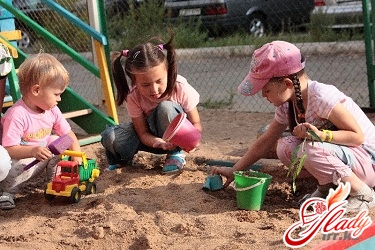 So, the period of preparation for the kindergarten was left behind andHere, at last, with the heart sinking from excitement, you first come into the group. What can you expect? Very often the kid runs headlong to the children, even forgetting to say goodbye to his mother. And my mother with an easy heart leaves, rejoicing that the baby immediately got used to the kindergarten and she will not have to face all the "delights" of the adaptation period in the kindergarten. However, after a few days, and maybe even the next, the child begins to cry desperately, clinging to his mother. And this is quite normal phenomenon, because on the first day the kid just did not fully understand the changes that kindergarten life brings. Of course, this is extremely distressing for parents who begin to doubt whether they did the right thing and decided to give the baby to a kindergarten. In fact, do not worry so much, as the time of adaptation of the child to the kindergarten in most cases last from two weeks to a month. As a rule, almost all children face this. Below are listed those changes that occur with the baby and, in fact, cause the existing problems of getting used to the kindergarten:
So, the period of preparation for the kindergarten was left behind andHere, at last, with the heart sinking from excitement, you first come into the group. What can you expect? Very often the kid runs headlong to the children, even forgetting to say goodbye to his mother. And my mother with an easy heart leaves, rejoicing that the baby immediately got used to the kindergarten and she will not have to face all the "delights" of the adaptation period in the kindergarten. However, after a few days, and maybe even the next, the child begins to cry desperately, clinging to his mother. And this is quite normal phenomenon, because on the first day the kid just did not fully understand the changes that kindergarten life brings. Of course, this is extremely distressing for parents who begin to doubt whether they did the right thing and decided to give the baby to a kindergarten. In fact, do not worry so much, as the time of adaptation of the child to the kindergarten in most cases last from two weeks to a month. As a rule, almost all children face this. Below are listed those changes that occur with the baby and, in fact, cause the existing problems of getting used to the kindergarten:
- Emotional shock. As a rule, in the first days of visiting the kindergarten negative emotions take a leading position. Often the baby cries a lot: just whimpering, or he has a paroxysmal crying, crying "for the company" with other children. Sometimes, looking at the morning at the teacher, trying to calm the order of 15 bitterly and crying crumbs, she wants to sympathize with her. But only a few weeks pass of the adaptation period of the kindergartens in the kindergarten, as the picture changes radically and in the mornings teachers have the pleasure to contemplate the lovely contented children's faces.
- Difficult social contacts. As a rule, at the first time after the beginning of a visit to a kindergarten, even the most lively and outgoing children can become very closed and unsociable. Do not worry about this, it will take a very short time, the kid will get used to and become a former sociable child, willingly contacting both peers and educators.
- Reduction of natural cognitive activity. Baby for a while can stop being interested in the outside world. This is also quite normal reaction - the baby prefers to take an observant position. As soon as he is convinced that there is nothing to fear, his curiosity will quickly return to him.
- Moreover, very many babies are the first days in the gardenthey may lose their already existing self-service skills: the ability to use a spoon, self-dress and so on. However, very soon the skills will not only return in full, but will be replenished with new skills.
- Problems with speech. Very many kids experience certain speech difficulties. Children can begin to distort, or shorten words, but if the kid is experiencing a particularly difficult adaptation in the kindergarten, he may for some time stop speaking at all. Parents can not scold a child and this is to coerce him. As soon as the adaptation is over, speech will be restored to its full extent.
- In addition, very many parents faceviolation of normal motor activity in the child. Some babies can sit for hours in one place. And the others, on the contrary, can not sit still for a minute - it all depends on the temperament of each baby. As the development in the children's team, the situation is necessarily stabilized.
- Sleep disturbance. As a rule, during the first weeks a toddler may have difficulty falling asleep either during the day or at night. In addition, restless sleep, the appearance of nightmares. This phenomenon is also temporary and will soon disappear without a trace.
- Decreased appetite. Very many children in the first days of visiting the kindergarten eat very poorly. There are two possible explanations for this: unaccustomed to the baby food and a stressful situation, which in itself suppresses the appetite. To exclude the first reason, it is necessary to introduce in the diet of the baby a similar food in preparation for a kindergarten: soups, cereals, etc.
- Some children in the adaptation period begin to get sick a little more often than usual. The only thing that parents can do is to try to strengthen the immunity, as already mentioned above.
- Child psychologists give general advice onprogram of social adaptation to the kindergarten. Their observance will help reduce the chances that the adaptation period may drag on for an indefinite, long term.
First, the first few days are desirablejoint stay of mother and child in the group. At first the child can always be near you, but after a while interest in the surrounding will take over and the little one will start to move away from you in order to play. The first visit to the kindergarten should last about an hour, the next day the time can be increased to two to three hours. After a few days you need to leave the baby in the group one. Here is the main mistake that many parents make. They go away at a time when the kid is distracted. For a child, such a sudden disappearance can be a serious psychological trauma if the baby decides that his mother left him. It is much more correct to put the child to the notice that you are leaving. But be sure to promise the baby that you will take it right after playing, eating or walking. And, of course, try to take the child exactly at the promised time. This will allow the child to feel some stability, which is so necessary for him for mental balance. Of course, the child can begin to cry and not let you go. Here the teacher will come to your aid, who will do everything possible to distract the attention of the crumbs and calm him down. Very many children continue to cry at mum's leaving and in a week, and in a month. However, this does not always mean that the adaptation is wrong, or it is delayed. In most cases, the baby stops crying immediately after the parents leave, and the rest of the time he plays, and does not even remember his parents. Despite the fact that the adaptation process always scares parents, it passes very quickly. After a very short time your baby will get accustomed to the new role of the kindergartener for him and will feel himself a full member of the children's collective. The task of the parents is to facilitate their child's adaptation to the kindergarten as much as possible. We hope that this information will help you at such a crucial stage of your baby's growing up. We advise you to read:







